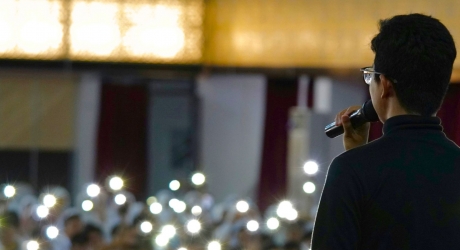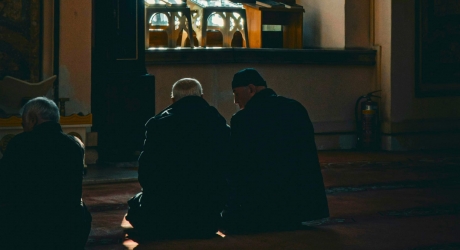The man Islam aims to build is one in whom a two-fold activity is set in motion at the same time, one form of activity being internal and the other external. The result of this twin activity is that the spiritual side of his nature develops in parallel with his intellectual advancement, both processes going on unhampered. On the one hand there is a strengthening of the moral fibre by which his personality assumes its permanent shape, and on the other, there is a broadening of his intellectual horizons.
Internal Development
How does the Islamic way of life set off inner activities in man? In this, the mainspring is the concept of accountability. Islam brings man to the realization that God Almighty is omnipresent and omniscient so that he has the feeling that for all his words and deeds—even intentions, he is accountable before Him. And after death he will have to face the divine court of justice, where the whole record of his life will be examined. And then, according to its verdict, he will be sent either to eternal hell or eternal Heaven. This feeling surging within him is so powerful that it shakes the entire human personality. A hadith thus admonishes the individual: Reckon yourself before being reckoned with. Weigh yourself before being weighed. And prepare yourself for the Great Appearance on Doomsday. (Al-Tirmidhi)
The consciousness of the presence of God activates all of the brain cells of the individual. A hunter once remarked: If you are walking through a jungle, and all of a sudden you notice a live tiger standing, in a nearby glade your blood stream will turn into a blood storm. This is what happens when we stand in the presence of a tiger. At every moment Islam brings man to the realization not only of the Creator of the tiger, but also of the Creator of the entire universe. One can judge when the thought of the presence of a tiger turns man’s blood stream into a blood storm, how great a storm the thought of the presence of the Creator of the tiger, that is, God Almighty, will be produced within a believer. Therefore, by his own inner compulsion, the believer becomes a man of character and a staunch believer. For him it becomes impossible to be immoral or unjust or dishonest in his conduct to his fellow men.
This concept of the presence of God is no negative matter. This is a wholly positive reality. This is because God is not simply a source of power. He is also a source of mercy. The storm brought about by the awareness of the presence of God awakens not only the feeling of fear, but a strong feeling of hope as well. Similarly, the feeling of the presence of God becomes a perpetual incentive for the positive development of the human personality. This, in Islamic terms, is called a spiritual revolution. In short, belief in Islam makes accountability to God man’s greatest permanent concern. The potential of spirituality latent within man is activated by his belief to the ultimate extent; this turns him into a spiritual superman. But the feeling of the presence of God Almighty also cuts man down to size. ‘And man cut to size’ is the ultimate phrase in the spiritual dictionary. Such a man succeeds to the utmost degree in finding all those things that he ought to experience at the spiritual level. He becomes a man of God through and through.
External Activities
The Islamic man is one who, in consonance with his spiritual development, experiences constant intellectual activity which results in the most intense brain storming. The intellectual awakening, or intellectual development of an Islamic man is so extensive that he becomes cerebrally activated to the highest possible extent. What is that external factor which stimulates this kind of intellectual activity in the Islamic man? It is da‘wah work.
According to the Quran, the Prophet of Islam is the final Prophet. Although no Prophet is going to come after him, the mission of the Prophet must continue. The Ummah of the Prophet, charged with carrying on this mission for posterity, is thus addressed in the Quran: And thus We made you an intermediary nation so that you might bear witness against the people and the Prophet might testify against you. (The Quran, 2:143)
A commentator of the Quran has interpreted this as follows: Muslims are intermediary between the Prophet and the nations of the world (Al-Tabari). In conformance with this, da‘wah work is obligatory for the Muslim Ummah. It is their essential duty to receive the divine message of the Prophet and convey it to the rest of humanity. It is not simply an act of annunciation. It is the most important struggle. Because of this the Quran says: Do with them the great jihad by the help of the Quran (The Quran, 25:52).
The Quran is a book, not a weapon. “Great jihad with the Quran” means a great religious endeavour; da’wah work is thus a great ideological struggle. It is a supreme intellectual effort which stretches to the utmost the mental capacity of the human being.
Intellectual Development
Da‘wah is a strictly non-political mission. But it is an extremely difficult task to perform, because it invites challenges from virtually all sections of society. The da‘i says: “Here is the truth with a capital T, and success in this world as well as in the world hereafter depends on the acceptance of this truth, so man has no choice but to accept it.” This kind of claim is highly provocative, eliciting reactions from every ideological group—religious, materialist, secular, atheist, etc.
The man with a mission throws down a challenge which provokes a response. A challenge-response-mechanism becomes operative which stimulates continuous interaction, involving questions and answers, discussions and dialogues. It is during this interaction that the process of intellectual development begins. As a mission, da‘wah work by its very nature is divine. Because of this people with a mission are bound by their code of ethics to respond in a positive manner to their audiences regardless of the latter’s misconduct. At all costs, they must, as a matter of principle, avoid all friction. As the Quran says: “Certainly, we (the Prophets) would bear with patience your persecution of us.” (The Quran, 14:12)
This positive behaviour on the part of people engaged in the da‘wah mission prevents them from succumbing to hatred for and violence against the other party. That again ensures that their intellectual growth and development will go on uninterruptedly. No situation whatsoever will halt this process of peaceful da’wah and, subsequently, the inner progress of those involved in it will continue ceaselessly. The Prophet Muhammad, may peace be upon him, once said: “Beware of the wisdom of mu’min (a believer), because he sees with the light of God.” How is it that a mu'min becomes a man of wisdom, in such a superior sense? It is because his faith makes him pious and God-fearing. In his state of piety, he undergoes the inner experience which psychologists call brainstorming. This helps activate his potential to the full extent. The result is miraculous: if, before, he was a man, now after this brainstorming, he becomes a superman.
Then comes da‘wah, that is, the call to Islam. According to the Quran, da‘wah is the great jihad. Why is da‘wah the great jihad, or great struggle? Because it is a universal mission. It is a most serious task. It engages one’s entire capacities throughout one’s whole life. Every time one is faced with intellectual challenges, one is bound to give a strong response. Thus, da‘wah becomes an extensive course of action through which one’s personality develops day by day, until one reaches the highest level of intellectual and spiritual development. Iman (faith) and da‘wah are two basic levels of Islam. If iman is a superior ideology, da‘wah is a superior course of action. Iman purifies one’s mind and soul, while da‘wah imbues one’s personality with a sublime probity. One who adopts Islam as a universal mission, in both the ideological and practical sense, is morally activated to the maximum possible extent and this course, slowly but surely, leads him to reach the highest pinnacle of humanity.
Stating the relationship between man and true religion the Quran says:
So you set your face towards the true faith uprightly, the upright nature with which God has endowed man, and let there be no alteration in God’s Creation. That is the right religion, although most men may not know it. (The Quran, 30:30)
This means that every human being is created by God to be capable—as a matter of his natural constitution—of accepting the religion of truth. The Unity of God is a truth, arrived at intuitively, and is plain to every man of common sense, unless he perverts himself by the different prejudices which he receives from his environment. Islam is thus the natural religion that a child left to itself would develop. A western writer, Lady Cobbold, has rightly described it:
Islam is the religion of common sense.
When this potential is realized, it results in the emergence of a new man. What kind of character is possessed by this new man is made clear by the following hadith:
Nine things the Lord has commanded me:
Fear of God in private and in public;
Justness, whether in anger or in calmness;
Moderation in both poverty and affluence;
Joining hands with those who break away from me;
and giving to those who deprive me;
and forgiving those who wrong me;
and making of my silence meditation;
and my words remembrance of God;
and taking a lesson from my observation.
(Razin) This hadith gives a complete picture of the man Islam wants to build.











